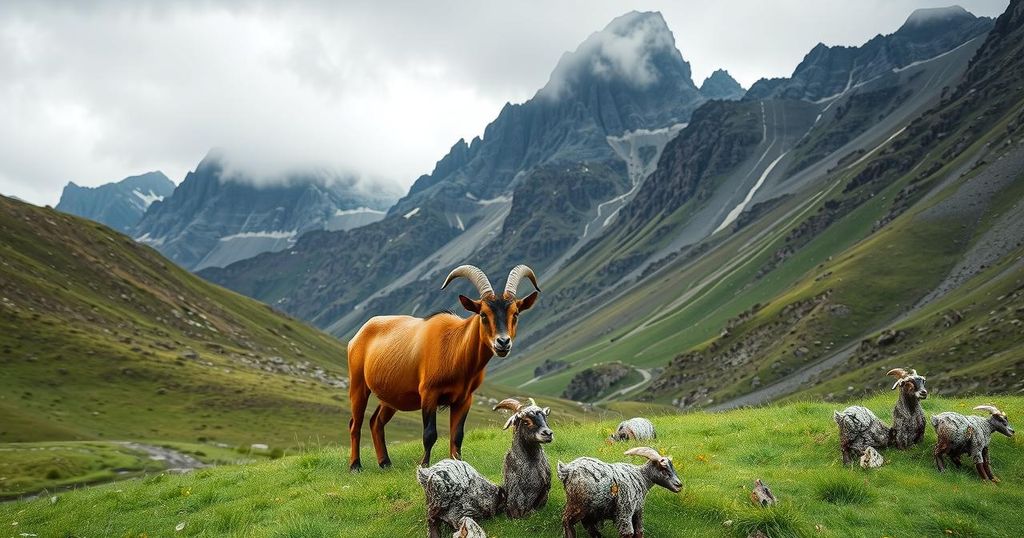Women Goat Herders in Chile Adapt to Climate Change and Earn Awards

Women goat herders in Ovalle, Chile, are adapting to climate change while producing award-winning cheeses. Despite prolonged droughts affecting water and pasture availability, they enhance product quality and innovate in response. Their efforts, highlighted by Yasna Molina’s acclaimed cheese, demonstrate resilience and the pursuit of designation of origin status to elevate local produce.
In Chile’s Ovalle municipality, women goat herders are expertly adapting to the impacts of climate change while maintaining their traditional practices. Despite facing prolonged drought conditions, these herders are enhancing the quality and variety of their goat cheese, leading to international acclaim. For instance, Yasna Molina’s blue cheese, Anqas, has won prestigious awards, showcasing how these women defend their heritage while responding to environmental challenges.
The drought crisis has drastically reduced water availability and forage for goats, compelling herders to modify traditional grazing methods. Recent rainfall measurements from La Serena indicate that the region received only 89.2 millimeters in 2024, resulting in the Limarí River reservoir operating at only 15 percent capacity. Consequently, many herders are relying on stable or semi-stable systems to sustain their herds, despite the fact that confined goats yield less milk.
Molina exemplifies these challenges and successes. She has received the National Award for Innovative Women in Agriculture in 2022 and continues to innovate by supplementing her goats’ diets to maintain productivity. Her examples highlight the viability of the Criollo breed, which performs better under drought conditions compared to other breeds adapted to milk production.
The migration of goat herders to higher, more distant grazing lands illustrates the severe impact of climate change on this traditional occupation. Many have been forced to relocate herds due to deteriorating conditions in their original grazing areas. For instance, Manuel Portilla explained how he had to move to San Fernando amidst a severe drought, only to face devastating weather events in his new location.
Experts like Claudia Torres stress that small goat herders are particularly vulnerable to climate challenges due to their reliance on traditional grazing practices and limited financial resources for supplementary feeding. She warns that the lack of serious regional policies governing watershed management may exacerbate these issues further.
The recognition of their products on the international stage is invigorating for these women. Molina believes that the distinctive flavors of their cheese could garner designation of origin status, which would elevate the value of their products and protect their heritage. Efforts are underway by experts to apply for such designation to promote the quality of Ovalle’s goat cheese in the market.
Local goat herders like Elsa Araya and Juana Pérez Milla showcase resilience in addressing challenges posed by the climate crisis. With innovations such as drip irrigation and diversified cheese varieties, they are adapting their production methods while meeting the evolving demands for quality goat cheese. Their perseverance embodies the spirit of adaptation amidst adversity, ensuring that this ancestral craft continues.
Overall, the experiences of these women goat herders illustrate a profound commitment to preserving their heritage, despite the significant challenges posed by climate change. They are not only adapting their practices but also gaining recognition for their dedication to quality and sustainability in goat cheese production, positioning Chilean cheeses favorably in international markets.
In conclusion, the enduring tradition of goat herding in Chile is facing unprecedented challenges due to climate change. However, women goat herders in Ovalle demonstrate remarkable resilience and adaptability. Through innovation, dedication to quality, and international recognition, they are working to ensure the sustainability of their craft. The potential for designation of origin and the embrace of modern agricultural practices signify a hopeful future for these herders, whose commitment honors their rich cultural heritage amidst changing environmental conditions.
Original Source: www.globalissues.org






